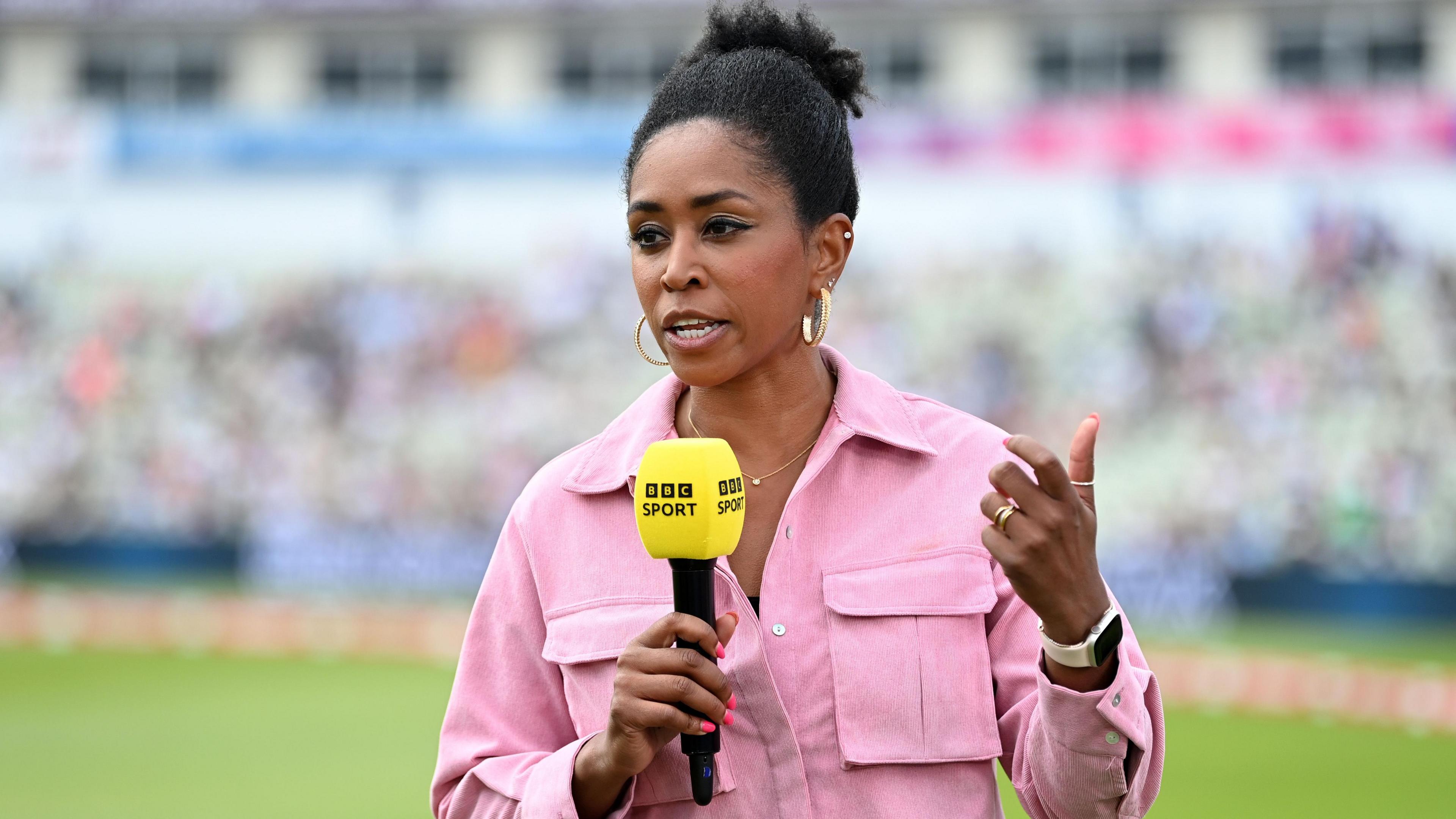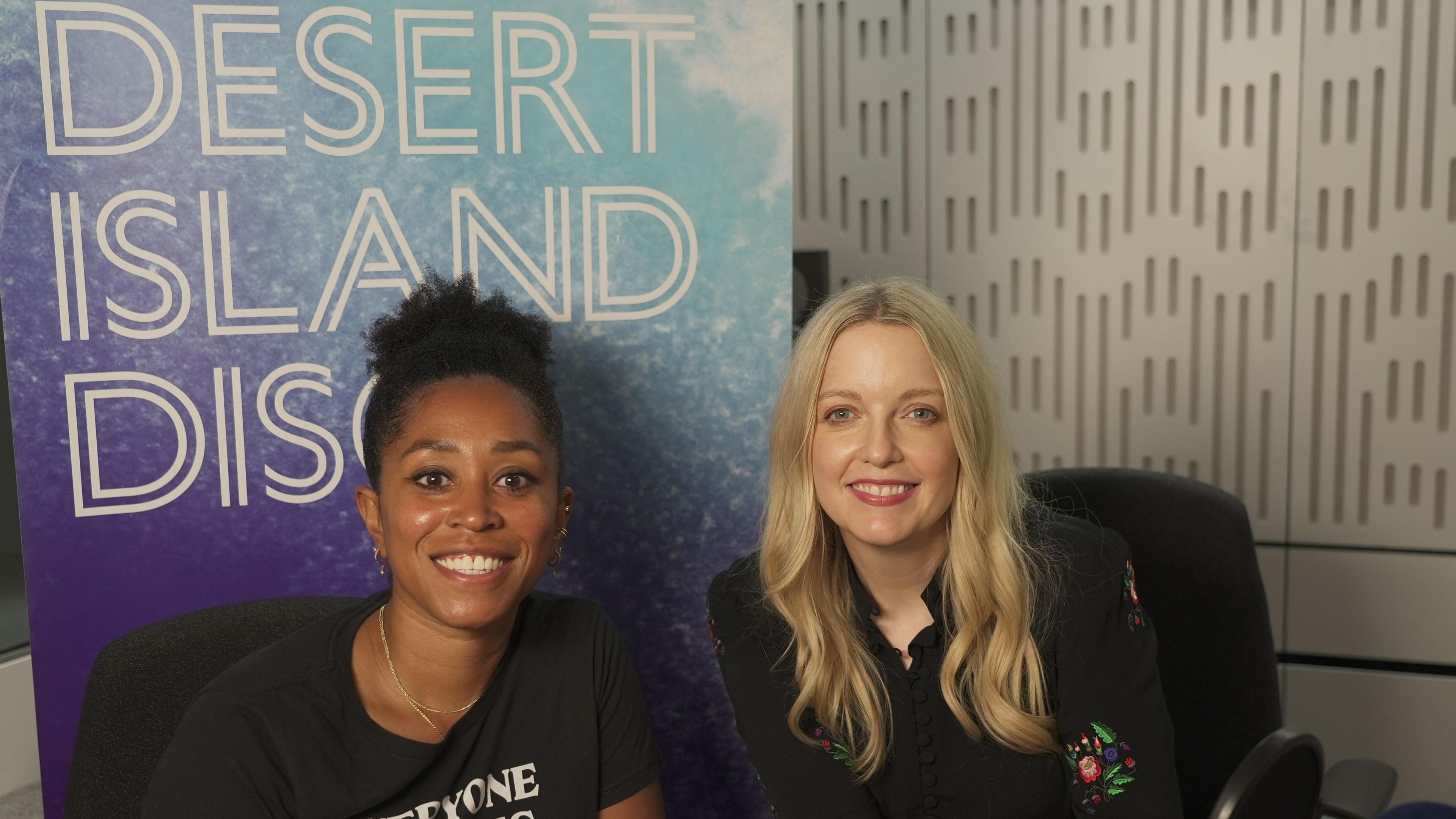'Rafiq ripped bandage off racism in cricket' - Rainford-Brent

Ebony Rainford-Brent is part of BBC Sport's coverage of cricket
- Published
Former England cricketer Ebony Rainford-Brent says cricket "owes a lot" to Azeem Rafiq for having the courage to "rip the bandage off" racism in the sport.
Rafiq first made claims of historical racism at Yorkshire in August 2020, later calling English cricket "institutionally racist".
An independent investigation commissioned by Yorkshire upheld seven of Rafiq's 43 claims in September 2021.
Last year a hearing found Rafiq's allegations against five former players were proven, and that the group had brought the game into disrepute through their use of racist and/or discriminatory language.
Rainford-Brent, 40, was the first black woman to play for England and spoke on BBC Radio 4's Desert Island Discs about the impact of Rafiq standing up to racism.
"I was so proud of him [Rafiq] because I knew the impact was not going to be pretty, but also I knew what he was doing was for the bigger picture," she said.
"I think we owe him, even though it's been a tough journey, we owe him a lot. I owe him a lot. I remember saying to him he'd done what I could never have done, which is to really rip the bandage off."
A report published by the Independent Commission for Equity in Cricket (ICEC) in June 2023 found that discrimination in cricket in England and Wales was "widespread".
The England and Wales Cricket Board (ECB) said in September 2023 it wanted "to change the game" in its response to a report detailing racism, sexism, classism and elitism in the sport.
Rainford-Brent, who retired from playing in 2012, is now a broadcaster and holds several administrative roles within the game, including a position as an ECB board non-executive director.
She said cricket has been "forced to be accountable" over racism but is "still a long way away" from "solving these problems".
"I don't want to pretend we are there, and I feel like we need to keep our foot on the gas for 20 years before we even see that deep-rooted cultural change," she added.
"Now we have some good plans in place I think the reality is things take time but we are seeing some growth so I am hopeful."
Anthony Joshua doesn't want son to take up boxing
- Attribution
- Published23 June 2024
I've got scars but no regrets from speaking out, says Azeem Rafiq
- Attribution
- Published13 June 2024
The birth of the world's first great black batter
- Published24 October 2022
'I didn't feel like I fitted in'

Ebony Rainford-Brent spoke candidly about her journey in cricket with Lauren Laverne on Desert Island Discs
Rainford-Brent represented England 29 times and was part of the team which won the Women's World Cup and the World T20 title in 2009.
However, her early experiences on cricket's pathways after being spotted at primary school were "quite challenging" because she "didn't feel like I fitted in" as a young black girl from southeast London largely playing with and against children from more affluent backgrounds.
"I was excited that you could see there was a path of something exciting ahead by representing your county," she said.
"But there was a lot of stages where I realised quite quickly when I moved into cricket I was quite different to the girls that I was playing with. Other kids had been getting one-to-ones [coaching] from aged eight.
"My first cricket bat we bought in Brixton for £5. I think it was from like the 1950s and someone had just got rid of it in a garden sale, and I used that through to playing junior England."
Rainford-Brent said she had to deal with comments about her hair, negative reactions to her mother's Jamaican food and initially found cricket a "different world" where "there wasn't diversity", which made forging a career a battle.
"The early days it was ignorance or misunderstanding. Then I had to deal with some environments where there was more explicit stuff around things that affected training," she explained.
"The hardest bit is then being - 'if I challenge this, I'm going to lose my spot or my place?' If I had challenged things I don't think it would have worked out well. In some ways, I wish I was more vocal and took on the system."
In a wide-ranging discussion with Desert Island Discs presenter Lauren Laverne, Rainford-Brent also talked about the impact of her brother being stabbed to death when she was five, and how her mother worked night shifts to support her cricketing dreams.
She also touches on the African Caribbean Engagement (ACE) charity she established four years ago.
The programme aims to re-engage young people of African and Caribbean heritage with cricket and address a significant decline in the number of black professional players in the sport.
"To see so many young people chase their dreams, but also in a supportive environment has been really special," said Rainford-Brent.
Listen to Ebony Rainford-Brent on Desert Island Discs on BBC Radio 4 and via BBC Sounds at 10:00 GMT on 8 December.
Related topics
- Published16 August
